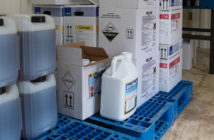The Agricultural Industries Confederation (AIC) has welcomed the granting of equivalence for UK certified seed of cereal, fodder, beet, vegetable, oil and fibre plants by the EU, which means that seed can now be exported to the EU.
“This long awaited approval is very welcome, despite coming very late in the season. Equivalence was confirmed by the Council of the EU and then voted through with a significant majority by the European Parliament on 8th March, however it took until 29th March for it to be published in the Official Journal of the European Union, and thus give exports the go-ahead,” explained Catherine Barrett, AIC’s head of seed and arable marketing.
“However, it is not all plain sailing for seed exporters. There are a number of new requirements for exporting certified seed to the EU because the UK is now a third country.
“While the equivalence of field inspections and maintenance of varieties in the UK has been accepted, the variety will need to be on the EU Common Catalogue and the seed must comply with the EU Plant Health Regulation and the EU Official Controls Regulation.”
Exporters from GB will now need to obtain a Phytosanitary Certificate prior to exporting the seed and arrange with the EU customer the completion of a Common Health Entry Document for Plant Products (CHED PP) through TRACES (Trade Control and Export System). This is an EU online system used by traders or their agents to provide pre-notification of Sanitary and Phytosanitary (SPS) goods entering the European Union.
The seed will also need to be OECD labelled where it is a species in an OECD scheme, be ISTA sampled, and have an Orange International Certificate.
GB exporters have been able to export to NI under these terms since 4th February, as DAERA allowed an advance recognition of equivalence to make sure the NI market was supplied.




